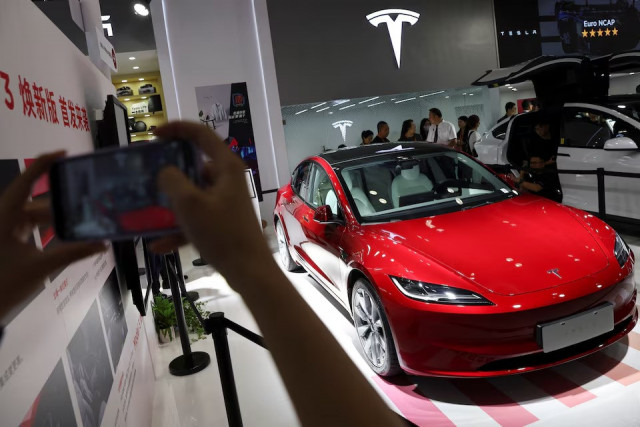Tesla's tariff on Chinese-made EVs cut to 9% by EU Commission
In response to alleged unfair subsidies, the EU revises duties on Chinese EVs, provoking Beijing's warnings

The European Union has significantly reduced its proposed additional tariff on Tesla's electric vehicles imported from China, lowering it from the previously suggested 20.8% to 9%, according to an announcement on Tuesday. This adjustment follows further investigations initiated at Tesla's request.
The European Commission also revised its draft punitive duties on Chinese-made electric vehicles as part of its high-profile investigation into alleged Chinese subsidies, a move that has sparked warnings of retaliation from Beijing. The new, reduced rate of 9% for Tesla contrasts with the standard 10% tariff already imposed on car imports by the EU. This measure, the Commission argues, is intended to create a level playing field and address what it sees as unfair subsidies.
Tesla had sought a recalculation of its tariff rate based on the specific subsidies it received. The Commission confirmed on Tuesday that Tesla benefited from fewer subsidies compared to other Chinese electric vehicle manufacturers that were part of the investigation.
The European Commission, which is responsible for setting trade policies in the EU, continues to assert that Chinese electric vehicle production has been heavily subsidised. It proposed tariffs of up to 36.3% for other companies, slightly reduced from the initial maximum of 37.6% outlined in July for those companies that did not cooperate with the EU's anti-subsidy probe.
In response, China’s commerce ministry expressed strong opposition to the findings, describing them as being based on "unilateral" determinations by the EU. The ministry called for the EU to find a reasonable and pragmatic solution to avoid escalating trade tensions and indicated that it might take all necessary steps to protect Chinese firms. Earlier this month, Beijing lodged a complaint with the World Trade Organisation.
Tesla, which was classified as a cooperating entity in the investigation, did not comment on the developments. The Commission also announced slight reductions in the provisional duties for three other Chinese companies that had been included in the investigation. For instance, BYD will now face a rate of 17.0%, down from 17.4% in July, Geely's tariff was adjusted to 19.3% from 19.9%, and SAIC's duty was reduced to 36.3% from 37.6%.
Additionally, Chinese companies involved in joint ventures with EU automakers may also benefit from reduced duties. Volkswagen’s SEAT subsidiary, for example, is now expected to receive a lower tariff of 21.3% on its Cupra Tavascan, produced through a joint venture in China primarily owned by the German automaker. Similarly, BMW’s joint venture in China that produces the electric Mini has been classified as a "cooperating company," qualifying it for the reduced duty of 21.3%, compared to the 37.6% initially proposed.
These provisional tariffs could become permanent once the EU's investigation concludes in approximately two months. Interested parties have until 30 August to submit their comments on the Commission’s findings. The proposed final duties will be subject to approval by the EU’s 27 member states. Unless a qualified majority, representing 65% of the EU population, votes against them, these duties will be implemented. A final decision is expected by 30 October.



















COMMENTS
Comments are moderated and generally will be posted if they are on-topic and not abusive.
For more information, please see our Comments FAQ